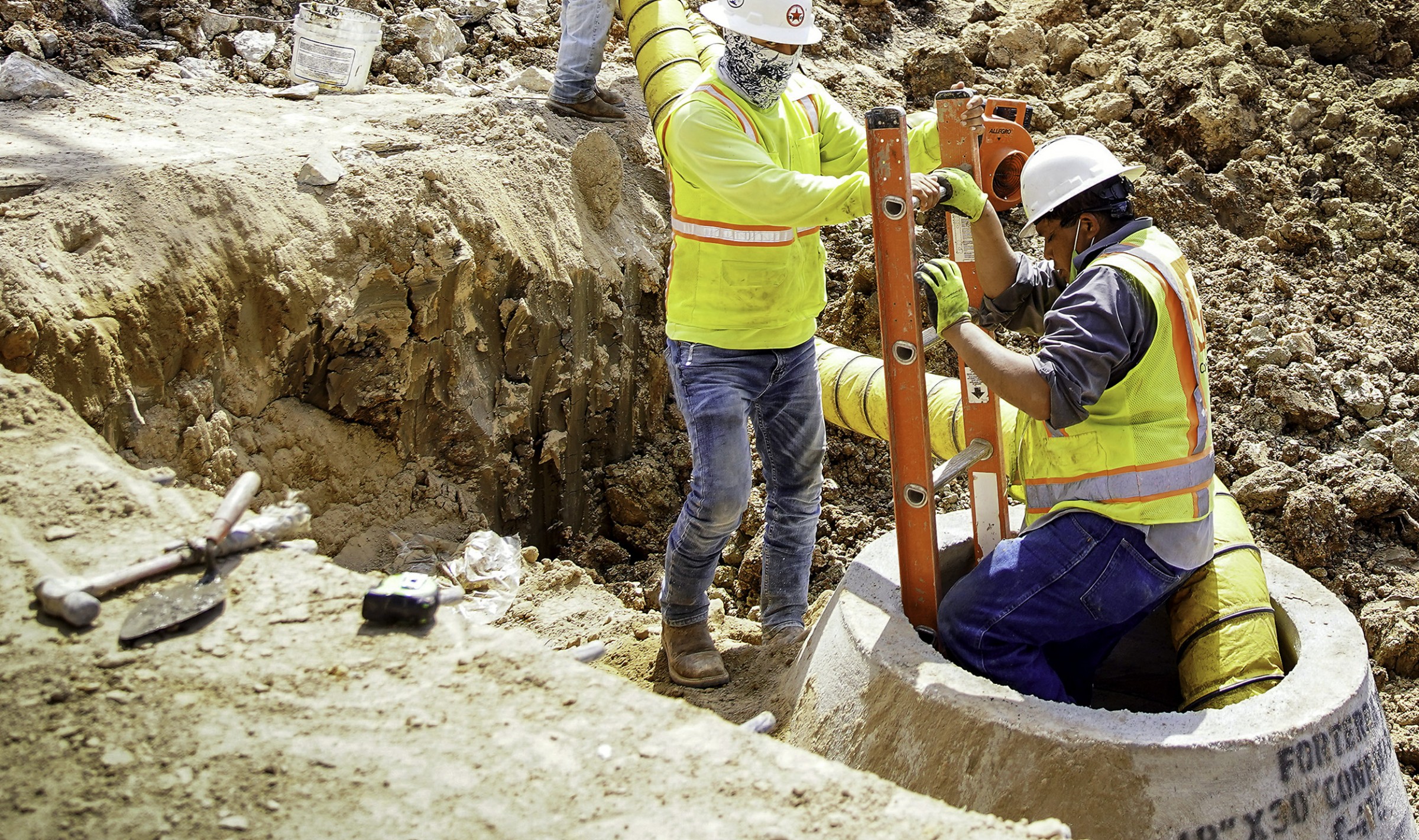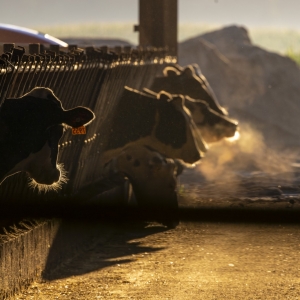The Stream, November 30, 2022: Activists in France Clash with Armed Guards at Proposed Reservoir Sites

Contractors for Houston Public Works work on a wastewater and drainage project in the Greater Eastwood neighborhood in Houston, Texas. Photo © Elizabeth Conley / Circle of Blue
YOUR GLOBAL RUNDOWN
- After a power outage at a water treatment plant, a boil-water order was issued for the Houston area.
- Planned reservoirs in France’s farming regions are the site of protests and military protection.
- Faced with persistent drought, Hopi corn farmers in northern Arizona combine traditional harvesting techniques with new irrigation methods.
- A new global study outlines fresh water’s crucial role in climate change mitigation, food treatment, biodiversity enrichment, and energy management systems.
Waste continues to flow into Lake Suchitlan, El Salvador’s largest freshwater lake and key drinking water source.
“There are no jobs here in Potonico. So that also motivated us to clean up the lake, and we appreciate it because it will give us jobs.” – Dora Elsy Tobar, a volunteer on the Lake Suchitlan clean-up crew.
Images circulated this week showing an El Salvadorian cooperative Piedra del Idioma cleaning the nation’s largest body of freshwater, Lake Suchitlan. Despite being a protected site, the lake is overrun with algal blooms, sludge, and plastic waste. It is considered one of Central America’s most polluted natural areas.
To the outrage of many, on the heels of COP27, the El Salvador government recently cut the budget that funded Suchitlan’s cleaning efforts. The garbage is introduced from the Lempa River, which runs through Guatemala and Honduras.
AP reports that the local communities and wildlife, despite hardly contributing to the pollution, are left to face the health and economic consequences of Suchitlan’s continued deterioration.
— Christian Thorsberg, Interim Stream Editor
Recent WaterNews from Circle of Blue
- Federal Water Tap, November 28 — EPA Determines Pennsylvania Will Not Meet Chesapeake Bay Pollution-Reduction Goal
- FRESH, November 22 — Freshwater Mussel Revival in the Chicago River
The Lead
A boil-water order was issued on Sunday night for the Houston area after two power failures at a water treatment plant limited the facility’s ability to pump and filter drinking water. More than 2 million people were affected by the order, and some schools were closed on Monday as a result of the water disruption. Houston Public Works sent citizens an online map to check if their home address was impacted, and many residents flocked to stores for bottled water.
Effective Tuesday morning, the city lifted the ordinance after testing determined that water met all safety standards. Despite this, the Houston Independent School District, the largest public school system in Texas, remained closed.
This Week’s Top Water Stories, Told In Numbers
1,600
The number of armed military guards protecting the future site of a water reservoir in western France. Heat waves and drought have made water scarce throughout the country’s rural areas, and the government intends to build multiple large reservoirs for farm irrigation. But environmental activists are resisting these projects for three main reasons. They say the reservoirs — built mostly using taxpayer funds — will contribute to wasteful, water-intensive farming practices. The reservoirs could harm nearby wetland ecosystems. And the reservoirs demonstrate a privatization of water that will benefit a few industrial farms. Recent clashes between the guards and eco-protestors have been referred to as “France’s water wars,” The New York Times reports.
2,000
Number of years the Hopi people have been living in modern-day Arizona, with thousands more spent in South America, Central America, and Mexico. The tribe has developed and perfected dry farming, a method that has yielded many generations of successful harvests in the arid Four Corners region. But droughts induced by climate change have taken a toll in recent years. Now, some Hopi farmers are combining both traditional practices with new irrigation techniques to salvage their harvests, and raise sacred heirloom Hopi blue, gray, red and white corn, InsideClimate News reports.
On the Radar
A report from the Stockholm International Water Institute finds that “the role of water in climate mitigation is much greater than commonly understood.” Over nine chapters, the report details how freshwater systems and their management — including water’s role in food networks, waste and sanitation, and the study of protective freshwater ecosystems such as marshes, swamps, and peatlands — have too seldom been appreciated by global frameworks for mitigating the effects of climate change. Bridging this knowledge gap, according to the report, has “not yet been clearly articulated and recognized.” An increased focus on water’s role in climate mitigation may bring about solutions — including reducing greenhouse gas emissions, sequestering carbon, protecting biodiversity, and improving soil quality.
In context: In Climate Talks, Plans to Keep Planet from Overheating Should Not Ignore Water
More Water News
Salton Sea: The California lake, ravaged by drought, will receive $250 million in federal funding for environmental cleanup and restoration.
Hydropower: Water levels in Zimbabwe’s biggest dam are too low for power generation.
Brett writes about agriculture, energy, infrastructure, and the politics and economics of water in the United States. He also writes the Federal Water Tap, Circle of Blue’s weekly digest of U.S. government water news. He is the winner of two Society of Environmental Journalists reporting awards, one of the top honors in American environmental journalism: first place for explanatory reporting for a series on septic system pollution in the United States(2016) and third place for beat reporting in a small market (2014). He received the Sierra Club’s Distinguished Service Award in 2018. Brett lives in Seattle, where he hikes the mountains and bakes pies. Contact Brett Walton







Leave a Reply
Want to join the discussion?Feel free to contribute!